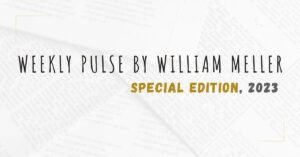The Weekly Pulse is my content curation and my highlights from readings, books, podcasts, insights, and everything I discovered during the week.
So, let’s go with some discoveries from the week!
#1 – Discovery-Driven Planning
#2 – Three Keys to Building a More Skilled Postpandemic
#3 – I am a Saboteur
#4 – The Practices That Set Learning Organizations Apart
#5 – When Your Culture Needs a Makeover
Discovery-Driven Planning
Source: Harvard Business Review
Author: Rita Gunther McGrath and Ian C. MacMillan
Summary: Discovery-driven planning is a practical tool that acknowledges the difference between planning for a new venture and planning for a more conventional line of business. Conventional planning operates on the premise that managers can extrapolate future results from a well-understood and predictable platform of past experience. One expects predictions to be accurate because they are based on solid knowledge rather than on assumptions. In platform-based planning, a venture’s deviations from the plan are a bad thing.
3 Highlights:
“… Because assumptions about the unknown generally turn out to be wrong, new ventures inevitably experience deviations—often huge ones—from their original planned targets. Indeed, new ventures frequently require fundamental redirection…“
“… Unlike platform-based planning, in which much is known, discovery-driven planning forces managers to articulate what they don’t know, and it forces a discipline for learning. As a planning tool, it thus raises the visibility of the make-or-break uncertainties common to new ventures and helps managers address them at the lowest possible cost...”
“… Milestone planning is by now a familiar technique for monitoring the progress of new ventures. The basic idea, as described by Zenas Block and Ian C. MacMillan in the book Corporate Venturing (Harvard Business School Press, 1993), is to postpone major commitments of resources until the evidence from the previous milestone event signals that the risk of taking the next step is justified…”
Access the full Weekly Pulse here >>
Three Keys to Building a More Skilled Postpandemic
Source: McKinsey
Author: Jutta Bodem-Schrötgens, Angelika Reich, Bill Schaninger, and Kartik Sharma
Summary: Many companies face large, and growing, skills deficits. A few companies approach skill building in a more integrated way—and are quietly gaining an edge on rivals. Intriguingly, the skills companies prioritize most are leadership and managing others, critical thinking and decision making, and project management.
3 Highlights:
“… Companies are more likely to gain an edge in skill-building when their leaders are willing to question old assumptions. Legacy approaches are likely to be too slow, too incremental, or too difficult to scale given the challenges ahead…“
“… Companies need to prepare their people for a future where new and evolving skills and ways of working are a given and where an embrace of continuous learning is the key to relevancy in the workplace. And leaders must do this while embarking on the broader organizational experiment of determining what the workplace even looks like in a post-COVID-19 world…”
“… Organizations must also be willing to question their legacy mindsets, including presumptions of what employees want and what they’re capable of. Employees are often more energized by skills’ development than senior executives give them credit for…”
Access the full Weekly Pulse here >>
I am a Saboteur
Source: Fast Company
Author: Daniel Pink
Summary: The new economy is awash in contradictions, but few are more troubling than this one: At the very moment that brainpower is more important than ever, education seems more backward than ever. We have a new economy but outdated schools.
3 Highlights:
“… Let’s shift to the world of business and work for a moment. Grades and gold stars in school prepare people for pay raises and promotions on the job, don’t they?…“
“… We would have a much better teaching staff if we waived the requirement of having a college degree and opened the jobs to anyone. We’d have a much better teaching staff if we simply didn’t allow anyone under the age of 40 to teach. I would also say that we could draw workers from the retired population of the country much more than we do today…”
“… Homeschooling returns the most significant responsibility right back to where it belongs: the parent. Do all parents do it better than anyone else? Some do, some don’t. But are there any experts whom you can point to who does it better than any homeschooler picked at random? No…”
Access the full Weekly Pulse here >>
The Practices That Set Learning Organizations Apart
Source: MIT Sloan Management Review
Author: David G. Collings and John McMackin
Summary: Organizations are struggling to keep pace with the new skills needed in their workforces, thanks to large-scale trends such as the shift to digital business models and the increased adoption of workplace automation, AI, and advanced analytics. The pandemic accelerated those trends, putting an increased premium on learning and development (L&D) as a means of equipping companies to handle both long-term challenges and short-term crises.
3 Highlights:
“… We also had a few organizations report that adopting agile methodologies in their HR and L&D teams have aided their ability to adapt quickly in response to changing business needs...“
“… The disruptions caused by the pandemic have shown companies how rapidly the priorities and requirements of L&D functions can change. This volatility challenges L&D teams to be responsive and agile. Rather than seeking perfection in program offerings, nimble L&D teams think in terms of getting a minimal viable product into the hands of users, testing the program, learning from experience, and making iterative changes and upgrades over time…”
“… In fact, the shift to learning in the flow of work can offer real advantages in terms of employee engagement…”
Access the full Weekly Pulse here >>
When Your Culture Needs a Makeover
Source: Harvard Business Review
Author: Carol Lavin Bernick
Summary: Have we finished the job of changing our culture? Not yet, despite a lot of positive changes. Cultural change, perhaps obviously, is not one change but numerous changes. There’s a lot of ownership of culture around the organization, and it’s become a shared passion.
3 Highlights:
“… Passion is probably the single prerequisite to cultural change, for those inclined to attempt it. If you’re not passionate about it, don’t even bother….“
“… It wasn’t our people who were to blame; Culver employees have always been decent and hardworking. It was our culture. We needed people to have a sense of ownership and urgency around the business, to welcome innovation, and take risks. But in the existing culture, people dutifully waited for marching orders and thought of their bosses’ needs before their customers’. Through long-standing practice, rooted in good intentions, we had sheltered our people from our detailed operating results and all the business realities that drove them. In doing so, we had denied them the knowledge and perspective that could make them our true partners in growing the business.…”
“… Passion, in fact, is probably the single prerequisite to cultural change, for those inclined to attempt it. If you’re not passionate about it, don’t even bother. Every decision we make, we now see, is an opportunity to support or to undermine the culture we want.…”
Access the full Weekly Pulse here >>
Do you want to get new content in your Email?
I am incredibly grateful that you have taken the time to read this Weekly Pulse.
The Weekly Pulse is an important section of this website, aiming to share good stuff with you every week!
Do you want to explore more? Check more Weekly Pulse content here.
Check my main categories of content below:
- Agile
- Blog
- Book Notes
- Career
- Leadership
- Management
- Managing Yourself
- Productivity
- Project Management
- Technology
- Weekly Pulse
Navigate between the many topics covered in this website:
Agile Art Artificial Intelligence Blockchain Books Business Business Tales Career Coaching Communication Creativity Culture Cybersecurity Design DevOps Economy Emotional Intelligence Feedback Flow Focus Gaming Goals GPT Habits Health History Innovation Kanban Leadership Lean Life Managament Management Mentorship Metaverse Metrics Mindset Minimalism Motivation Negotiation Networking Neuroscience NFT Ownership Parenting Planning PMBOK PMI Politics Productivity Products Project Management Projects Pulse Readings Routines Scrum Self-Improvement Self-Management Sleep Startups Strategy Team Building Technology Time Management Volunteering Work
Do you want to check previous Weekly Pulse posts? Check the last couple of weeks:
- Weekly Pulse by William Meller | Special Edition, 2023
- Weekly Pulse by William Meller | Week 51, 2023
- Weekly Pulse by William Meller | Week 50, 2023
- Weekly Pulse by William Meller | Week 49, 2023
- Weekly Pulse by William Meller | Week 48, 2023
Support my work by sharing my content with your network using the sharing buttons below.
Want to show your support tangibly? A virtual coffee is a small but nice way to show your appreciation and give me the extra energy to keep crafting valuable content! Pay me a coffee:





